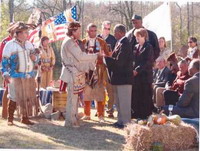Unrecognized American Indian tribe prohibited from selling tribal memberships
A Texas judge ruled to prohibit an unrecognized American Indian tribe and its self-proclaimed chief from selling tribal memberships, thus falsely claiming the documents would provide protection from deportation.

District Judge Noe Gonzalez ruled that Malcolm Webber and his Wichita-based Kaweah Indian Nation by default admitted the allegations in a lawsuit filed by Texas Attorney General Greg Abbott. Gonzalez issued the ruling because the tribe and Webber failed to answer the lawsuit filed in August alleging they violated the Texas Deceptive Trade Practices Act.
The lawsuit contended that the tribe sold memberships for up to $400 (273 EUR) per person to immigrants by saying that members could get a Social Security number. The lawsuit also alleged that immigrants were told they would be entitled to receive U.S. citizenship once the tribe was federally recognized.
The Bureau of Indian Affairs ruled in 1984 that the Kaweah group had no historical link to American Indian tribes and that Webber is not an Indian.
The civil action against two other defendants - Ralph Benny Tipton of San Antonio and Victor Ramirez of Edinburg, Texas - continues, said Paco Felici, spokesman for the Texas Attorney General's office. A trial date has not been set.
"We are obviously working as hard as we can to put a permanent end to this fraud and seek justice for harmed consumers," Felici said.
Tipton and Ramirez have not been criminally charged, but they have denied the allegations in the lawsuit. Their attorneys could not immediately be reached for comment Monday.
Monday's ruling prohibits Kaweah and Webber from selling memberships or representing the Kaweah Indian Nation as an acknowledged tribe. It also enjoins them from representing that being a member of the tribe will entitle a person to a Social Security number, protection from deportation and U.S. citizenship.
Gonzalez also ordered them to not conceal or destroy any documents related to their business and prohibited them from claiming that the Bureau of Citizen and Immigration Services has approved any services for sale by them.
Kurt Kerns, the court-appointed defense attorney representing the tribe and Webber in a separate federal criminal case with similar allegations, did not immediately return a call for comment. Kerns previously has said that Webber was a victim of renegade underlings who sold tribal memberships to immigrants and pocketed the money.
Manuel Urbina, who in the past represented himself as a tribal chief and spokesman for the Kaweah, said Monday that he was no longer affiliated with the tribe and did not know anything about the Texas case.
"There is nothing for me to say about it," Urbina said.
Felici said any restitution and penalties against the group and Webber would be determined once the rest of the lawsuit against the remaining defendants is finished. The lawsuit seeks restitution for victims and a fine of up to $20,000 (13,648 EUR) for each violation.
Separately, the U.S. attorney's office in Wichita has filed federal charges against the tribe and 11 employees. That case is scheduled for trial on Aug. 5, 2008.
Assistant U.S. Attorney Brent Anderson told a federal judge earlier this month he anticipated filing a superseding indictment adding more defendants and charges in a complex case that spans at least 10 states and involves an estimated 10,000 victims.
Subscribe to Pravda.Ru Telegram channel, Facebook, RSS!


